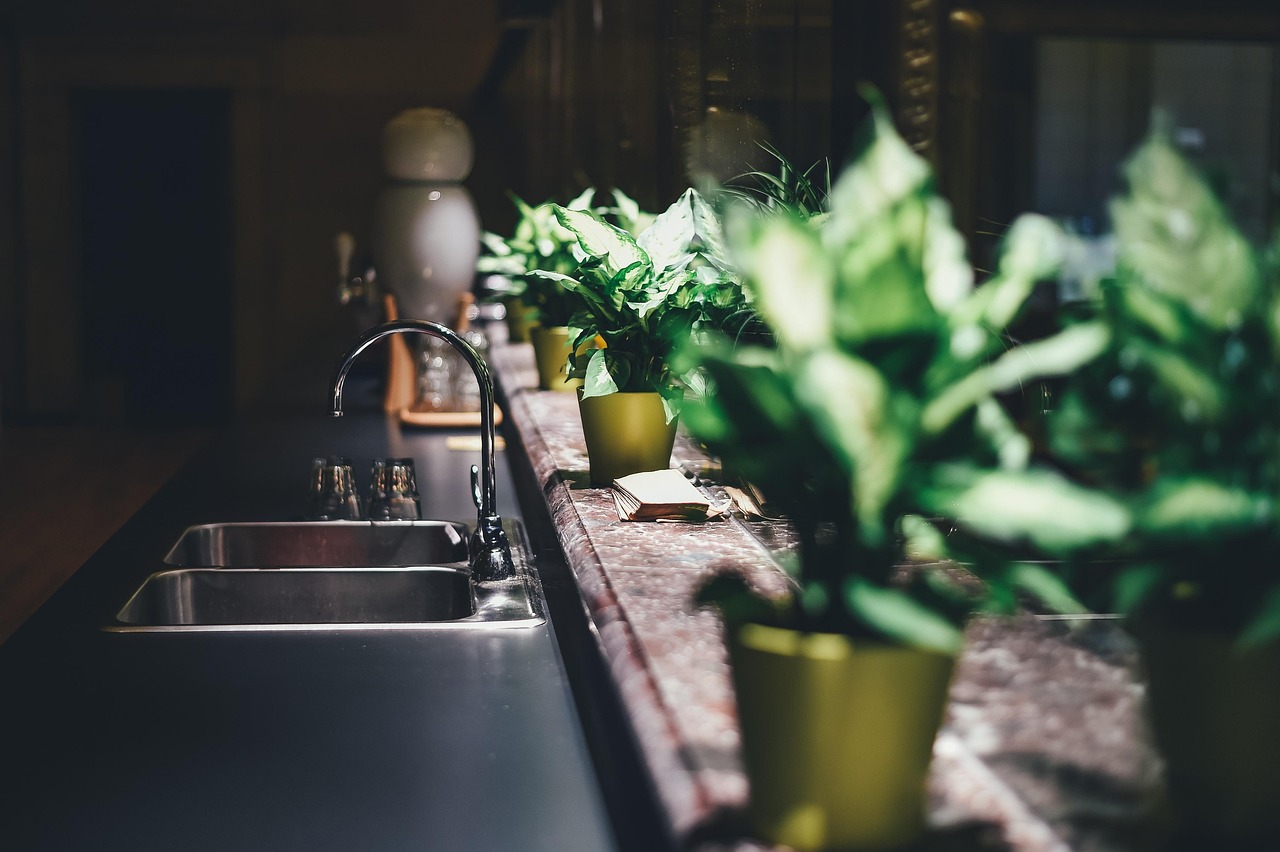Starting a small herb garden in your kitchen is not just a delightful way to ensure a fresh supply of herbs but also a rewarding hobby that can bring life and fragrance into your home. Let’s dive deeper into the steps and considerations for creating your own thriving kitchen herb garden, with practical tips and insights that will enhance your gardening experience.
Assessing Space and Lighting Conditions
When embarking on your herb garden journey, the very first task is to evaluate your kitchen space. Herbs thrive on sunlight, typically needing about 6 hours of it each day. You’re looking for a spot near a south or west-facing window if possible, as these locations usually provide the most consistent light. However, don’t fret if your kitchen lacks natural sunlight; you can supplement with grow lights. Modern LED grow lights are energy-efficient and can be tailored to emit the specific light spectrum that most closely mimics sunlight, ensuring your herbs get what they need even on cloudy days or in low-light kitchens.
Creative Space Solutions
No window space? No problem. Consider vertical gardening options like wall-mounted planters or tiered shelves. These solutions maximize space and can turn any wall into a lush, green feature. Hanging planters are another stylish option, allowing your herbs to cascade down and adding an aesthetic element to your kitchen decor. If you have room on your countertop, a simple herb stand can also do the trick, keeping your herbs within arm’s reach while cooking.
Example: A friend of mine, Sarah, lives in a cozy apartment with limited sunlight. She installed a set of tiered shelves next to her refrigerator and used LED grow lights. Her herbs are thriving, and the shelves have become a stunning focal point in her kitchen.
Choosing Your Herbs
The selection of herbs goes beyond just personal taste. Think about how frequently you use each herb and in what quantities. For instance, if you love Italian cuisine, basil and oregano might be indispensable. If Asian flavors are more your style, consider cilantro and Thai basil. Here are some considerations for beginners:
- Basil: Thrives in warmth and sunlight; ideal for pesto and Italian dishes.
- Mint: Hardy and versatile; perfect for teas, desserts, and cocktails.
- Parsley: A robust herb that adds a fresh note to salads and garnishes.
- Thyme: Offers a subtle, earthy flavor; great for soups and stews.
Expanding Your Herb Palette
Once you’ve mastered the basics, don’t hesitate to experiment with less common herbs like lemon balm, chives, or dill. Each brings unique flavors and health benefits, adding variety to your dishes and vitality to your garden.
Pro Tip: When choosing new herbs, think about their compatibility with your current ones. For example, rosemary and sage have similar care requirements and can often be potted together.
Selecting the Right Containers
The container you choose will be the home of your herbs, so select wisely. Clay pots are breathable, which helps prevent overwatering, but they can dry out quickly. Plastic pots retain moisture better but might require more attention to drainage. Whatever material you choose, ensure your pots have ample drainage holes.
Pot Size Matters
Herbs like basil and parsley need room to grow, so choose larger pots of at least 6-8 inches in diameter. Smaller herbs like thyme can thrive in more compact spaces. Grouping herbs with similar water and light needs in a single container can also be efficient and aesthetically pleasing.
Case Study: My neighbor opted for biodegradable pots made from recycled materials. Not only are they eco-friendly, but they also add a rustic charm to her kitchen setting.
Caring for Your Herb Garden
Consistent care is key to a thriving herb garden. Watering is a balancing act; the soil should be kept moist but not soggy. Stick a finger into the soil about an inch deep. If it feels dry, it’s time to water. Consider using a self-watering pot if you’re often on the go.
Fertilization Tips
Herbs benefit from a light feeding every 4-6 weeks. A liquid seaweed or fish emulsion can provide necessary nutrients without overwhelming your plants. Be cautious with over-fertilization, as it can lead to lush foliage but poor flavor development.
Example: John, an avid herb gardener, uses a homemade compost tea to fertilize his plants. He swears by the rich nutrients it provides, resulting in more flavorful herbs.
Pest Control and Maintenance
Pests like aphids or spider mites can occasionally invade your kitchen garden. Regularly inspect your plants, especially on the undersides of leaves. A simple mix of water and mild soap can often deter many pests. For a more natural approach, ladybugs can be introduced as they’re a natural predator of many common pests.
Pruning and Harvesting
Pruning is crucial not only for harvesting but also for promoting growth. Regularly snip your herbs to encourage bushiness. When harvesting, cut just above a leaf node to stimulate new growth. This way, your herbs become fuller and you’ll have more to harvest next time.
Practical Tip: Use sharp scissors or pruning shears to avoid damaging the plant. Dull tools can crush the stems, hindering regrowth.
Using and Preserving Herbs
Once you start harvesting, you’ll find endless ways to incorporate fresh herbs into your meals. A sprinkle of fresh basil can transform a simple pasta dish, while mint can elevate a fruit salad. For preservation, drying is the most common method. Simply hang small bunches upside down in a dark, dry place. Alternatively, freezing herbs in ice cube trays with a bit of water or oil can create convenient, ready-to-use portions.
Creative Culinary Uses
Consider making herb-infused oils or vinegars for a gourmet touch to your dishes. These can be excellent for dressing salads or drizzling over roasted vegetables. Herbal butters are another delightful way to preserve herbs, perfect for spreading on fresh bread or melting over steaks and seafood.
Example: My aunt prepares basil-infused olive oil every summer. It’s her secret ingredient for a simple yet elegant caprese salad.
Troubleshooting Common Issues
Even with the best care, sometimes things go awry. Leggy plants often indicate insufficient light, so reassess your lighting situation or consider rotating your pots more frequently. Yellowing leaves can be a sign of overwatering or nutrient deficiency. Adjust your watering schedule or try a soil test kit to diagnose and remedy the issue promptly.
Common Mistake: Overcrowding pots can lead to competition for resources. Ensure each herb has enough space to thrive by following the recommended pot sizes.
Sustainability and Eco-Friendly Practices
Gardening is a wonderful opportunity to practice sustainability. Use organic soil and fertilizers to minimize chemical runoff. Reuse kitchen scraps like eggshells or coffee grounds as natural fertilizers. If you choose to upgrade your pots, consider biodegradable options made from bamboo or recycled materials.
Composting Tips
Creating a small compost bin in your kitchen can be a fantastic way to recycle vegetable scraps and coffee grounds. This nutrient-rich compost can be mixed into your potting soil, enhancing its fertility and structure.
Example: My brother started a countertop compost bin and noticed a significant improvement in the growth and health of his herb garden.
Building a Community
Gardening can be a solitary pleasure or a community endeavor. Share cuttings or seeds with friends and family, or join local gardening groups to exchange tips and experiences. Many communities have online forums where you can swap advice and support each other’s gardening journeys.
Community Highlight: In my local area, there’s a monthly herb swap meet. It’s a great way to discover new herbs, share successes, and learn from others’ experiences.
The Joy of Kitchen Gardening
Ultimately, a kitchen herb garden is about more than just growing plants. It’s an opportunity to slow down, connect with nature, and enjoy the simple pleasure of nurturing something from seed to harvest. The satisfaction that comes from snipping your own fresh herbs for dinner is unmatched, and the process itself can be a form of meditation, offering a moment of peace in a busy day.
By taking the time to thoughtfully plan, plant, and care for your herb garden, you’re investing in your home, your cooking, and your well-being. So roll up your sleeves, get your hands dirty, and enjoy the beautiful, fragrant journey of kitchen herb gardening.
Advanced Herb Gardening Techniques
Once you’ve got the basics down, you might want to explore more advanced techniques to optimize your herb garden.
Hydroponic Herb Gardening
Hydroponics involves growing plants without soil, using a nutrient-rich water solution. This method can save space and water, and it allows you to grow herbs year-round. Systems range from simple DIY setups to sophisticated kits with automated nutrient delivery.
Pro Tip: A small hydroponic system can be set up with a few basic supplies like a water pump, a reservoir, and net pots. Herbs like basil and mint adapt well to hydroponic conditions.
Companion Planting
Understanding which herbs grow well together can enhance your garden’s productivity and health. For example, basil benefits from being planted near tomatoes as it can help repel pests that typically affect tomatoes.
Practical Insight: Avoid planting fennel near most herbs, as it can inhibit their growth due to allelopathic chemicals it releases.
Engaging Children in Herb Gardening
Herb gardening can be a wonderful way to introduce children to the joys of gardening. It’s educational and can teach them about plant biology, responsibility, and the importance of sustainability.
Kid-Friendly Herbs
Choose herbs that are easy to grow and have interesting textures or smells that appeal to children, such as mint or lemon balm. Encourage them to take responsibility for watering and caring for their chosen herbs.
Activity Suggestion: Create a “pizza garden” with herbs like basil, oregano, and parsley. Once the herbs are grown, involve your kids in making a homemade pizza topped with their harvested herbs.
Seasonal Considerations
While herbs can be grown year-round indoors, seasonal changes can impact their growth. In winter, the reduced sunlight might require additional lighting, while summer might necessitate more frequent watering due to increased evaporation.
Adjusting Care Throughout the Year
- Spring/Summer: Increase watering frequency and consider repotting herbs that have outgrown their containers.
- Fall/Winter: Reduce watering and ensure adequate light, possibly with supplemental grow lights.
Example: My cousin adjusts her watering schedule and uses a timer on her grow lights to simulate longer daylight hours during the winter months.
By expanding your herb gardening knowledge and incorporating these advanced techniques and additional insights, you can create a more efficient, productive, and rewarding herb gardening experience. Whether you’re a novice or a seasoned gardener, there’s always something new to learn and enjoy in the world of kitchen gardening.




